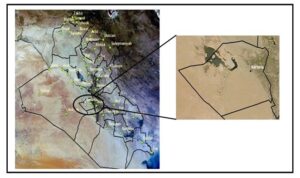أهمية توظيف الذكاء الاصطناعي في تدريس العلوم بسلك الابتدائي

أ.د.خالد الزهاني
أستاذ محاضر، المركز الجهوي لمهن التربية والتكوين
الرباط سلا القنيطرة، فرع القنيطرة، المغرب
k.ezhani@gmail.com
أستاذ التعليم العالي، المركز الجهوي لمهن التربية والتكوين
الرباط سلا القنيطرة، فرع القنيطرة، المغرب،
touir8@gmail.com
+212670526959
الملخص
مقدمة البحث: يعد التعليم وتعليم العلوم خصوصا قاطرة تنمية المجتمعات، ووسيلة أساسية في تقدمها وازدهارها، يتطور بتطور أساليبه وطرقه وأدواته، حيث أصبحت التكنولوجيا الحديثة وتطبيقات الذكاء الاصطناعي أدوات قوية في تعزيز تعلم العلوم لدى الطلاب والمتعلمين بصفة عامة ومتعلمي السلك الابتدائي بصفة خاصة، من خلال توفير طرق تفاعلية وممتعة أثناء محاكاة التجارب وتقديم المفاهيم العلمية وتطبيقها عمليا.
مشكلة البحث: ما أثر الإدماج والاستخدام المبكر والمبتكر للتكنولوجيا وللذكاء الاصطناعي في تعزيز التفاعل والتشاركية والإقدام على التعلم في مجال العلوم خصوصا تعليم النشاط العلمي، والذي يجعل من تعلمها تجربة شيقة ومحفزة للمتعلمين.
هدف البحث يهدف البحث من خلال دراسة تحليلية ووصفية، التعرف على أهمية استخدام التطبيقات التعليمية التي تعتمد على الذكاء الاصطناعي، والتي يمكن من خلالها تحفيز المتعلمين على الاستكشاف وعلى تطوير مهاراتهم العلمية بطرق مبتكرة وجديدة تتجاوز الطرق التقليدية التي تعتمد على الحفظ والتلقين، كما يهدف هذا البحث الى استكشاف كيفية تأثير استخدام الذكاء الاصطناعي في تطوير نماذج الأنشطة العلمية وطرق التدريس في المدرسة الابتدائية، وكذا التعرف على كيفية استخدام التكنولوجيا المبتكرة والتطبيقات الذكية لتحفيز المتعلمين وتحسين استيعابهم وفهمهم للعلوم، وكذلك الى تجويد الممارسة المهنية للمدرس، حيث سنتطرق أيضا الى فوائد تكنولوجيا الذكاء الاصطناعي في تعزيز التفكير النقدي لدى المتعلم وتعزيز التعلم النشط لديه، مبرزين أهمية تعزيز التعلم النشط والمشاركة الفعالة باستخدام التكنولوجيا المبتكرة في الصفوف الابتدائية على تحسن النتائج التعليمية بصفة عامة، ومستعرضين بعض الأدوات الذكاء الاصطناعي وبعض التجارب الرائدة في هذا المجال، والأفاق المستقبلية لهذا العلم في التعليم، وكذا التحديات والمخاطر المحتملة لاستخدام الذكاء الاصطناعي في التدريس.
استنتاج وتوصيات: من خلال هذا البحث خلصنا الى أن مستقبل التعليم وتعليم العلوم مرتبط باستخدام وادماج تقنيات الذكاء الاصطناعي. لذا نوصي بإدماج هذه التقنيات في المراحل الدراسية الأولى بالخصوص، استخدام سيفتح أمام المدارس الابتدائية الأبواب أمام عالم جديد من الفرص والإمكانيات التعليمية سواء بالنسبة للمدرس أو المتعلم، وسيؤثر على تطوير المناهج الدراسية وأساليب التدريس في المستقبل وعلى تقديم تعليم متطور يتكيف مع التطورات الحديثة في عالم تكنولوجيا المعلومات والاتصالات والذكاء الاصطناعي المتغير والمتطور باستمرار.
الكلمات المفتاحية : الذكاء الاصطناعي، تدريس العلوم، تطبيقات ذكية، منصات للذكاء الاصطناعي.
The value of incorporating artificial intelligence in teaching science at the primary level
Prof. Dr. Khalid Zhani
Lecturer, Regional Center for Education and Training Professions
Rabat-Salé-Kenitra, Kenitra Branch, Morocco
Prof. Dr. Rachid Touir
Professor of Higher Education, Regional Center for Education and Training Professions
Rabat-Salé-Kenitra, Kenitra Branch, Morocco,
Abstract:
Research introduction: Learning and teaching science in particular is the locomotive of the development of societies, and an essential means of their progress and prosperity, evolving with the development of its methods and tools, as modern technology and artificial intelligence applications have become powerful tools in enhancing science learning for students and pupils in general and primary school students in particular, by providing interactive and fun ways while simulating experiments, presenting scientific concepts, and applying them practically.
Research Problem: What is the impact of the integration and early and innovative use of technology and artificial intelligence in enhancing interaction, participation, and learning in the field of science, especially the teaching of scientific activity, making it an interesting and motivating experience for learners?
Research goal: This research aims to identify the importance of using educational applications based on artificial intelligence, through which learners can be motivated to explore and develop their scientific skills in innovative and new ways beyond the traditional methods that rely on memorization and rote learning. This research also aims to explore how the use of artificial intelligence affects the development of models of scientific activities and teaching methods in primary schools, as well as identify how innovative technology and smart applications are used to motivate learners and improve their understanding of science. We will also address the benefits of artificial intelligence technology in teaching and learning in primary schools.
Conclusion and recommendations: Through this research, we concluded that the future of learning and science teaching is linked to the use and integration of artificial intelligence technologies. Therefore, we recommend the integration of these technologies in the early stages of schooling, In particular, the use of these technologies in primary schools will open the doors to a new world of educational opportunities and possibilities for both the teacher and the learner and will affect the development of curricula and teaching methods in the future and the provision of advanced education that adapts to modern developments in the ever-changing and evolving world of ICT and artificial intelligence.
Keywords: artificial intelligence, science teaching, smart apps, artificial intelligence platforms.
للاطلاع على كامل البحث الرجاء الضغط على الرابط التالي :
https://drive.google.com/file/d/1DCxi9hzjk7IU5lL20n2mEHDBZaBgD9_R/view?usp=sharing



